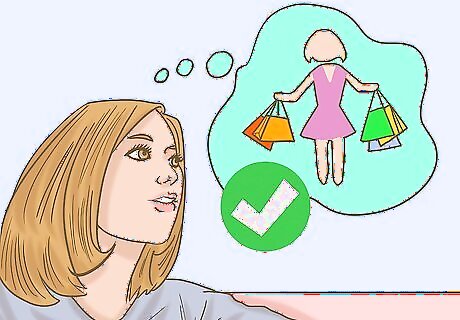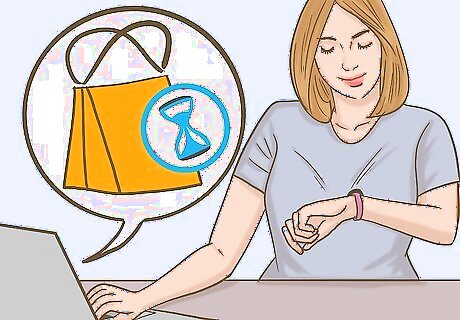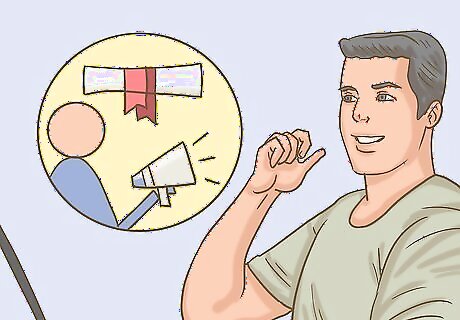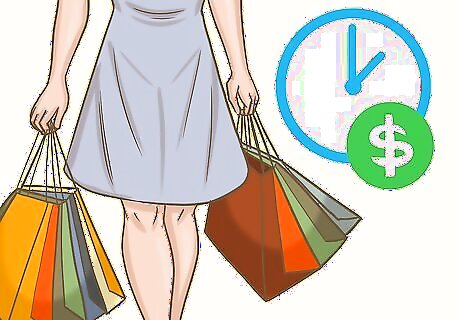
views
Developing the Necessary Skills

Choose what sort of shopping you want to specialize in. Personal shoppers can offer their services for any type of goods, so pick an area of focus that you want. While some shoppers buy household needs, others may buy clothes for their clients. Decide what type of shopping you want to do and offer that as your main service. Personal shopping for the elderly usually includes buying groceries and household necessities. Other personal shoppers may select styles and clothes for individuals who don’t have time to shop. If you want to shop for fashion items, try focusing on a certain aspect of it, such as tops or shoes. That way, you don’t get overwhelmed by selecting an entire wardrobe.

Work on building your customer service skills. Personal shoppers must work closely with their clients so they can provide them with the best experience. Stay attentive to people’s needs and communicate clearly with them. Be patient with them so they feel comfortable while you’re working with them. Make sure to give people your full attention while working with them so you can develop a personal connection with them.

Learn how to manage a budget. Personal shoppers need to work with the budget of their clients to get the most out of their money. Familiarize yourself with programs like Excel or Google Sheets so you can easily make budget charts. Pay attention to prices and the things a client wants so you can give them the best experience. See if a friend or family member will provide you with a budget and the things they want so you can practice shopping for them.

Have flexible work hours. Many personal shoppers work after normal work hours or on weekends since that’s when their clients are available. Make sure to manage your time well so you can meet with your clients and still shop for them on short notice. Some shoppers also need to go between multiple stores, so make sure you’re able to easily get around in a timely manner. Always be available for your clients so they can rely on you to get the job done.

Follow fashion trends to see what styles are popular. Look through fashion magazines and lookbooks to see what trends and styles are prominent. Visit stores frequently to see new items that are coming in so you can familiarize yourself with the products and be knowledgable about them. If you plan on being a personal shopper for groceries or other household goods, you don’t need to pay as much attention to fashion.Tip: Be sure to look at fashion trends for all body types and lifestyles so you can work with a variety of clients.
Getting an Education

Focus on business and math classes in school. If you’re still in high school, take math as well as any business or marketing electives available. Pay attention and study hard so you can learn how to run a business and develop budgets you can use. Be sure to take notes so you can reference them later. If you’re out of school, look for online courses so you can continue learning.

Try for a communications or marketing degree if you want. Since personal shoppers need to work with customers and market themselves, look for colleges that offer 2- or 4-year degrees. Focus on taking courses in financial management, business, and interpersonal communication so you have the skills to work well with your clients. A degree isn’t required to become a personal shopper, but it can be beneficial to learn how to manage your own business.

Get a fashion degree if you want to be a personal shopper for clothing. Many universities offer degrees in fashion management or design. Pay attention to your courses, and focus on classes that discuss fashion trends and styles. Take time to read and study so you can pass all of your exams and be knowledgeable on how to manage your business. You don’t need a fashion degree to become a personal shopper, but it could help add to your credibility.Tip: Network with your professors and classmates so you can search for potential clients or mentors.

Get a certification with the Association of Image Consultants International. The Association of Image Consultants International (AICI) is an independent organization that certifies personal shoppers in the fashion industry. The certification requires you to take an online exam that asks questions about fashion trends and how to communicate with others in a personal shopping setting. If you pass the exam, then you must submit an online portfolio of your work along with client evaluations. If your portfolio is accepted by the AICI, then you are certified! You don’t need a certification in order to be a personal shopper, but it will look better on a resume and add credibility to your work.
Finding a Job

Start looking for retail positions in stores with personal shoppers. Some larger department stores offer personal shopper services so you can recommend items for them. Look for retail stores in your area and see what open positions they have available. Even if the retail store doesn’t have personal shopper positions, you can communicate with customers to see if they want to be your clients. Some big box stores also have personal shopper positions where you fulfill online orders for the customers.

Look for a mentor or internship with another personal shopper. Search online for personal shoppers in your area to see what their services are like. Reach out to them and see if they’re taking any mentors or offering internships. Let them know your career goals so they can help you out as best as they can. If there aren’t any private personal shoppers in your area, look at a nearby department store to see if they have personal shopping services.

Create a website and social media accounts for your service. Since many personal shoppers run their own business, you need to brand yourself so others can find you. Make social media accounts for your business so others can find you and follow you. Post regularly so others can see what you’re doing and that you’re actively taking clients. If you can, use a website designer to make your own site where potential clients can easily contact you and learn more. Try writing a blog if you want to include updates on trends or styles you like to get clients excited about them.

Make business cards to hand out to potential clients. Create business cards using editing software or use an online template. Make sure to include your name, phone number, email address, and website so others can easily find you. Hand your card out to clients so they know how to reach you to talk about your services. Leave your business cards on public bulletin boards so other people can find you easily.

Talk to potential clients to see if they want your services. If you’re working in a retail store, talk to the customers to see if they have an interest in a personal shopper. If you aren’t in retail, talk to people that you already know. Ask them to meet with you so you can hold a conversation and see if you would work well together. Ask your first clients if you can use them as references so you can reach out to more people.

Set your fees so you get paid hourly. Many personal shoppers work for an hourly fee since they need to go to multiple stores and could take awhile. Choose a starting rate for consulting with your clients, which is usually around $25-$30 USD per hour, and meet with them to talk about what they expect. Then, you can charge an additional $20-$30 for every hour you spend shopping. The average annual salary for personal shoppers is between $30,000-$57,500 USD yearly. As you get more experienced and get multiple clients, you can start charging more for your services. Don’t take a percentage of the amount that your client spent because they might think you’re finding expensive products to make more money.

















Comments
0 comment